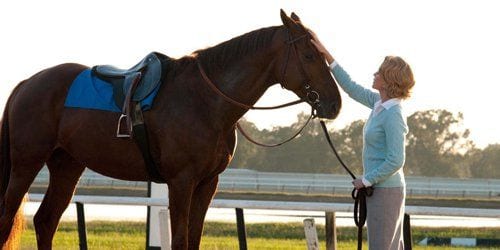
Secretariat was a spectacular racehorse, one of those rare creatures who lived up to his hype. From the moment he was born, according to Secretariat, this big red colt is ready to go, on his feet immediately and so delighting the humans assembled to oversee the event “You ever seen anything like that?” Trainer-to-be Lucien Laurin (John Malkovich) asks Eddie Sweat (Nelsan Ellis), the charismatic groom who works at Penny Chenery Tweedy’s Meadow Farm. “No sir!” comes the predictable answer. Penny herself (Diane Lane) asks for an explanation, so viewers unfamiliar with horses might also understand, that baby horses usually take a few minutes to stand up.
Such is the staging of Secretariat, repeatedly preposterous and contrived, overly explanatory and frequently melodramatic. The film mixes and delivers on all kinds of agendas, the story of the horse who won the Triple Crown in 1973 is at once inspiring, goofy, and galling. The horse (played by a number of large-framed chestnut beauties) is magnificent, captured in slow motion, in appreciative long shots and in awesome close-ups. When Penny looks into his eyes and asserts afterward that he’s ready to go, Lucien and Eddie only nod and smile, exchanging glances that suggest that while they’re aware that owners can’t possibly know their horses better than the workers who tend to them daily, this owner is something else.
Specifically, she’s the lady hero in a movie about a world dominated by men, a character type not exactly coined but certainly solidified in The Blind Side. Like Sandy Bullock’s Leigh Anne Tuohy, Penny takes on a project no one believes she can handle, here the running of her father’s horse farm (after that father, played by Scott Glenn, dies). Both Penny’s husband Jack (Dylan Walsh) and her brother Hollis (Dylan Baker) advise her to sell the place, rather than spend her time in Virginia and, once Secretariat is grown up and running, at racetracks (that is, away from her home, husband, and four children in Denver). She holds firm, of course, determined to sustain and even expand her dad’s legacy.
Secretariat’s superstardom certainly does all that. It also serves in the film as a way for Penny to learn and model Important Life Lessons, in particular for her oldest headbanded daughter Kate (AJ Michalka). She appears early on to be interested in performing in an anti-war play at school (this being 1972, when U.S. forces were still quagmired in Vietnam): Jack disapproves, but Penny suggests that Kate pursue the project, especially when the school board shuts it down. Free speech is good, as is women’s participation in public spheres. When Penny later swats down a question at a press conference concerning her ability to run a multi-million dollar business, being a “housewife,” she’s speaking both to her male audience (sports reporters, trainers, other owners) and to Kate (and by extension of course, all the horse-loving girls who will be seeing Secretariat).
To tie Penny’s story to Secretariat’s, the movie offers up an expected if unlikely rearrangement of events, from Penny’s appearance in the stall during the colt’s birth to other scenes underscoring her crucial decision-making as to his career, not to mention her remarkable vision concerning his greatness. She instructs the eccentric Lucien (who takes his role as employee remarkably seriously), encourages the veteran jockey Ronnie Turcotte (Otto Thorwarth), and bonds with Eddie when she joins him in giving Secretariat a sponge bath while they sway to “Oh Happy Day.” (Secretariat is explicitly — and not incidentally — “targeting Christians”, using an advertising strategy similar to the very successful one devised for The Blind Side.)
Penny also negotiates with her husband, though it’s clear from the start that his demands that she “come home” are unreasonable. “How long do you think you can keep living two lives at once?” he complains, not noting that this is more or less what fathers and husbands who are also lawyers in the 1970s do as a matter of course. Penny’s business sense is mixed in with her horse sense, both emerging as if by magic (or some unspecified religious inspiration). This version of the horse is remarkably simple: egos and bank accounts are all large. Penny’s faith in Secretariat helps her as she navigates a sea of men who think she can’t keep up.
The story that Secretariat doesn’t quite explore is the one about the horse’s celebrity. Like Seabiscuit (an obvious model), it emphasizes the beauty of the animals, the size and mix of racetrack crowds (Eddie tends to stand in for the underclass here, as the reaction shots focus rather resolutely on the rich people). Also like Seabiscuit, Secretariat makes a rudimentary case that the horse’s victories resonate with a population in the throes of collective turmoil (the Depression and the ’70s, here remarkably absent of Civil Rights activism), showing the occasional frame full of fans, with signs and cheers supporting their hero.
Television made the shape of Secretariat’s stardom different from Seabiscuit’s, of course, and one particular scene here evokes the mixed effects of TV. While Penny is away at the Preakness, in the stands with all her horse friends, her family watches the race on TV back in Denver. Jack is reluctant to enjoy himself, resenting her absence, but soon enough pulled into his children’s excitement, the film cutting from face to face as they watch the TV screen. That the image on the screen is the actual race, rather than a reenactment, as used in the other race scenes, is a little thrilling in itself. As big and powerful as those reenacted close-ups may be, the sight of the real Big Red running down his opponents in the stretch is breathtaking.

![Call for Papers: All Things Reconsidered [MUSIC] May-August 2024](https://www.popmatters.com/wp-content/uploads/2024/04/all-things-reconsidered-call-music-may-2024-720x380.jpg)



